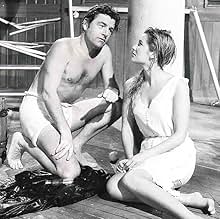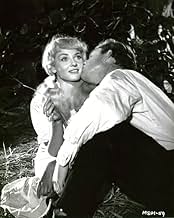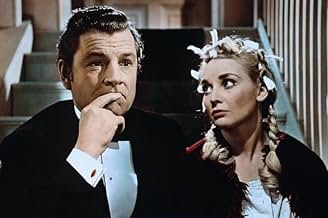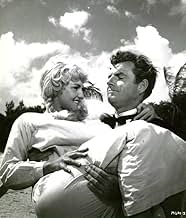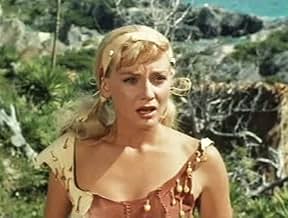IMDb RATING
7.1/10
2.2K
YOUR RATING
In 1905, Lord Henry Loam and his family and servants are shipwrecked on a deserted island where the survival of the fittest renders the rigid class system irrelevant.In 1905, Lord Henry Loam and his family and servants are shipwrecked on a deserted island where the survival of the fittest renders the rigid class system irrelevant.In 1905, Lord Henry Loam and his family and servants are shipwrecked on a deserted island where the survival of the fittest renders the rigid class system irrelevant.
- Director
- Writers
- Stars
Jack Armstrong
- Guest at Ball
- (uncredited)
- Director
- Writers
- All cast & crew
- Production, box office & more at IMDbPro
Featured reviews
JM Barrie's 1902 play is still entertaining and insightful nearly twelve decades later and really well worth checking out if you haven't already. The cast is a talented one, with Kenneth More deservedly being the most well known name. Have a lot more of Lewis Gilbert's work to see but much of what has already been seen has shown him to be a more than competent director and deserving of more credit, 'Reach for the Sky' and 'Educating Rita' being two examples.
The same can be said for the undervalued and not seen enough 'The Admirable Crichton'. While it is not perfect and may disappoint those that prefer adaptations to be one hundred percent faithful (with Tweeney's expanded role sacrificing some of what made the play so bold in its day), it is a very good film on its own terms (which is a fairer way to judge in my view) with so many good things. Good to see it get a lot of appreciation here.
Will agree that the social status jump does happen too fast and comes out of nowhere to jarring effect, the one thing that required some disbelief suspension.
Also that the ending is on the flat side, too quick and too pat.
So much is great however about 'The Admirable Crichton'. More is perfectly cast, he has such a genial charm about him and was clearly enjoying himself. Even better is Cecil Parker, who in my mind steals the film and some of the best lines come from him, great prissy authority and hilarious comic timing. Sally Ann Howes and Diane Cilento are radiant in appearance and personality. Gilbert directs with class and slickness throughout, his high appreciation for More as an actor is evident in how well he directs him in particular. The cast interact with each other beautifully.
Furthermore, 'The Admirable Crichton' looks great. Loved the sumptuous colour photography and glossy but not too much so art direction. The music is suitably elegant and fits the tone of the story well. The script has great whimsical charm, great insight in social statuses and classes and many lines that induce genuine laughter. The pace is lively. The story is slight but never dull, charmingly quaint, easy to follow and never too silly (not easy to do considering the type of story). It is also to me one of not many stage play to film adaptations from this period to not feel stage-bound or where stage origins are betrayed, and the material is loyally adapted with enough freshness to avoid it from dating.
Overall, very good and undervalued. 8/10.
The same can be said for the undervalued and not seen enough 'The Admirable Crichton'. While it is not perfect and may disappoint those that prefer adaptations to be one hundred percent faithful (with Tweeney's expanded role sacrificing some of what made the play so bold in its day), it is a very good film on its own terms (which is a fairer way to judge in my view) with so many good things. Good to see it get a lot of appreciation here.
Will agree that the social status jump does happen too fast and comes out of nowhere to jarring effect, the one thing that required some disbelief suspension.
Also that the ending is on the flat side, too quick and too pat.
So much is great however about 'The Admirable Crichton'. More is perfectly cast, he has such a genial charm about him and was clearly enjoying himself. Even better is Cecil Parker, who in my mind steals the film and some of the best lines come from him, great prissy authority and hilarious comic timing. Sally Ann Howes and Diane Cilento are radiant in appearance and personality. Gilbert directs with class and slickness throughout, his high appreciation for More as an actor is evident in how well he directs him in particular. The cast interact with each other beautifully.
Furthermore, 'The Admirable Crichton' looks great. Loved the sumptuous colour photography and glossy but not too much so art direction. The music is suitably elegant and fits the tone of the story well. The script has great whimsical charm, great insight in social statuses and classes and many lines that induce genuine laughter. The pace is lively. The story is slight but never dull, charmingly quaint, easy to follow and never too silly (not easy to do considering the type of story). It is also to me one of not many stage play to film adaptations from this period to not feel stage-bound or where stage origins are betrayed, and the material is loyally adapted with enough freshness to avoid it from dating.
Overall, very good and undervalued. 8/10.
The Admirable Crichton is an adaptation of J.M. Barrie's role reversal play, taking pot shots at the British class system and starring Kenneth More in the title role, it's something of a little treasure. Basically the plot sees Butler supreme Crichton become the governor of the desert island that he, and the toff family he serves, have been shipwrecked upon. The point being that these rich toffs, tho basically good people, are ill equipped to fend for themselves in the cold hard world. Crichton of course is well prepared for this new life forced upon them. He can cook, swim, catch fish, even start a fire, which none of the rich folk are capable of doing! We are of course asked to suspend a modicum of disbelief, I mean there are four sexy babes on this island and all of them start to fancy Crichton! Yes it's that sort of film folks. But it's a real well told story that is acted with fine skill, particularly from More and the infectious Cecil Parker as Lord Loam, whilst red blooded men such as myself get the benefit of some rather pretty looking ladies, especially Sally Ann Howes as Lady Mary. The ending is never really in doubt, but you know what, in this type of picture I didn't want it any other way. Highly recommended escapism. 7/10
J.M. Barrie's 1902 play, THE ADMIRABLE CRICHTON, illogically and crudely renamed for its U.S. release PARADISE LAGOON in reference to the setting of Barrie's transformative second and third (of four) acts, treats such universal themes of natural leadership that it may well be one of the most successfully copied - dare one say plagiarized? - plots extant. It has been speculated that Barrie himself filched the idea of a group of privileged persons stranded on a deserted island from an 1896 German play, ROBINSON'S EILAND, where a secretary emerges as the leader.
In 1947, French playwright Andre Roussin (claiming to trace his story from a 1921 Catalan play, NEVERTHELESS CIVILIZED) reduced Barrie's assortment of shipwrecked privileged Britons and their servants to a mere handful to focus on one romantic triangle but retained Barrie's essential structure for his THE LITTLE HUT which proved almost as successful (and as frequently filmed) as the Barrie classic on both sides of the Atlantic. From 1964 to 1967, CBS Television in the U.S. mined essentially the same territory (if decidedly Americanized - transmuting a failed South Seas cruise to a disastrous "three hour cruise" out of Hawaii and reducing the sexual competition to favor the status/qualification competition humor which could be infinitely stretched out) with a situation comedy called GILLIGAN'S ISLAND.
While this 1957 (British) Columbia Pictures adaptation of the Barrie play inexplicably softens the overt sexual competition on the island for Kenneth More's Crichton's attentions between "name" performer Sally Ann Howes' Lady Mary and second billed Diane Cilento as the lower class "Tweenie" (a maid in training), it admirably presents the essentials of Barrie's play with the "perfect" British butler holding his "master's" household together both in England and on an isolated South Sea isle - while exploring how different qualities may bring different people to the fore under different circumstances.
The always perfect foil Cecil Parker as Lord Loam is excellent as the titular head of the British household who becomes a better man as he naturally falls into Crichton's role on the island and suffers great pangs when "normality" is restored on their return home. As uniformly solid as the entire cast is however, for many the standout performance will be Martita Hunt's (Lady Bracknell influenced) Lady Brocklehurst - a clear homage from Barrie to Oscar Wilde's greatest play, the 1895 IMPORTANCE OF BEING EARNEST. Lady Brocklehurst, protecting her "family name" before allowing her son to announce his engagement to Lady Mary, is determined to find out what *really* happened on the island. Her questioning - and the comic obfuscation which parries it - is right up there with Lady Bracknell's inquisition of Earnest prior to his engagement to Cecily in Wilde.
The final curtain of the film nicely preserves the tension for the audience Barrie wished as to how Crichton will actually wind up. It is said that Barrie himself toyed with an alternate ending with Crichton ending up in a more "romantic" liaison. Barrie came to the conclusion however, that his audience "would not stand it." It's hard to say today - either way it's a warm, bittersweet finish fully worthy of the journey getting there.
It is also worth noting that the recent British DVD reissue of the film restores Kenneth More to the cover - the previously most available VHS release mistakenly boasted the handsomer supporting player (as the author Ernest Wooley) Gerald Harper on its cover as the "admirable Crichton" - at the moment a rescuing ship is sited. That "pan and scan" Columbia/Tristar VHS Home Video release also only offered the U.S. "PARADISE LAGOON" release, even though clearly labeled THE ADMIRABLE CRICHTON (the better known original title).
Either way, it's well worth a look - and inexcusable that this classic isn't more readily available for broad viewing today.
In 1947, French playwright Andre Roussin (claiming to trace his story from a 1921 Catalan play, NEVERTHELESS CIVILIZED) reduced Barrie's assortment of shipwrecked privileged Britons and their servants to a mere handful to focus on one romantic triangle but retained Barrie's essential structure for his THE LITTLE HUT which proved almost as successful (and as frequently filmed) as the Barrie classic on both sides of the Atlantic. From 1964 to 1967, CBS Television in the U.S. mined essentially the same territory (if decidedly Americanized - transmuting a failed South Seas cruise to a disastrous "three hour cruise" out of Hawaii and reducing the sexual competition to favor the status/qualification competition humor which could be infinitely stretched out) with a situation comedy called GILLIGAN'S ISLAND.
While this 1957 (British) Columbia Pictures adaptation of the Barrie play inexplicably softens the overt sexual competition on the island for Kenneth More's Crichton's attentions between "name" performer Sally Ann Howes' Lady Mary and second billed Diane Cilento as the lower class "Tweenie" (a maid in training), it admirably presents the essentials of Barrie's play with the "perfect" British butler holding his "master's" household together both in England and on an isolated South Sea isle - while exploring how different qualities may bring different people to the fore under different circumstances.
The always perfect foil Cecil Parker as Lord Loam is excellent as the titular head of the British household who becomes a better man as he naturally falls into Crichton's role on the island and suffers great pangs when "normality" is restored on their return home. As uniformly solid as the entire cast is however, for many the standout performance will be Martita Hunt's (Lady Bracknell influenced) Lady Brocklehurst - a clear homage from Barrie to Oscar Wilde's greatest play, the 1895 IMPORTANCE OF BEING EARNEST. Lady Brocklehurst, protecting her "family name" before allowing her son to announce his engagement to Lady Mary, is determined to find out what *really* happened on the island. Her questioning - and the comic obfuscation which parries it - is right up there with Lady Bracknell's inquisition of Earnest prior to his engagement to Cecily in Wilde.
The final curtain of the film nicely preserves the tension for the audience Barrie wished as to how Crichton will actually wind up. It is said that Barrie himself toyed with an alternate ending with Crichton ending up in a more "romantic" liaison. Barrie came to the conclusion however, that his audience "would not stand it." It's hard to say today - either way it's a warm, bittersweet finish fully worthy of the journey getting there.
It is also worth noting that the recent British DVD reissue of the film restores Kenneth More to the cover - the previously most available VHS release mistakenly boasted the handsomer supporting player (as the author Ernest Wooley) Gerald Harper on its cover as the "admirable Crichton" - at the moment a rescuing ship is sited. That "pan and scan" Columbia/Tristar VHS Home Video release also only offered the U.S. "PARADISE LAGOON" release, even though clearly labeled THE ADMIRABLE CRICHTON (the better known original title).
Either way, it's well worth a look - and inexcusable that this classic isn't more readily available for broad viewing today.
Wow what a great film, I can't believe this isn't considered one of the great classics of all time! More is perfect as Crichton, super-butler (and inspiration for the Red Dwarf character), who takes charge when the nice(-ish) but (very) dim family he serves are shipwrecked. Lots of hilarity in the early stages - (especially the classy dialog between Crichton and the ship's captain - "Will she sink?", "Not unless the engine blows up" (BOOM) "What, like that?" - hilarious), then a really nicely worked role-reversal sequence after they have settled in to their island paradise (although the whole "guv"-"daddy" thing sounds a bit strained and weird). Some interesting ideas about people's roles in society, the importance of leadership and heirarchy, in a gorgeous looking movie, with beautiful people in lovely period/desert island clothing, stunning scenery and a great beachhouse rivalling Swiss Family Robinson's. All the characters blossom under the sun and question their own attitudes and status in life, and show some really eye-opening attitudes (for the time) as the blokes start getting frisky. Poor little Tweeny's predicament nearly had me in tears! Looks like it's heading for a sad ending but works out almost lovely, a really enjoyable, heartwarming adventure/romance yarn with a nice chunk of social commentary and toff-bashing thrown in. Thoroughly recommended to anyone who likes a bit of old-fashioned, old-world entertainment now and again.
The 1957 version of the classic J.M. Barrie play -- yes, he wrote something besides Peter Pan -- benefits from its opening up, with a lot of shooting in Bermuda. Kenneth More is the butler who, when the yacht sinks, becomes the leader of the aristos by dint of his understanding that work must be done and how to do it; by the time they are unwillingly rescued, he's got the island organized and built up like a Buster Keaton set.
Cecil Parker plays his fuddy-duddy upper-class twit, but here clearly takes pleasure in playing against type in the scenes where he's Kenneth More's manservant. I thought it a bit odd that Diane Cilento played 'Tweenie' and Sally Ann Howes Parker's daughter; were I casting it, I would have switched those roles. Both ladies acquit themselves well. Martitia Hunt has a great small role as Lady Bracknell..... I mean Lady Brocklehurst.
Cecil Parker plays his fuddy-duddy upper-class twit, but here clearly takes pleasure in playing against type in the scenes where he's Kenneth More's manservant. I thought it a bit odd that Diane Cilento played 'Tweenie' and Sally Ann Howes Parker's daughter; were I casting it, I would have switched those roles. Both ladies acquit themselves well. Martitia Hunt has a great small role as Lady Bracknell..... I mean Lady Brocklehurst.
Did you know
- TriviaFor much of his role as Bill Crichton, Kenneth More was filmed from the waist up to hide the fact that he was wearing shorts with his dinner-jacket because of the heat during filming.
- GoofsWhen land is first sighted, Tweeny has only one arm on the oar when the binoculars are passed to Crichton. In the next shot, when Crichton is looking through the binoculars, she has both arms on the oar.
- Quotes
Lady Brocklehurst: George... Listen when anyone begins to answer with "The fact is... "
Brocklehurst: But why, mother?
Lady Brocklehurst: Because that is, usually, the beginning of a lie.
- Crazy creditsOpening credits prologue: LOAM HALL ENGLAND 1905
- ConnectionsFeatured in Talkies: Remembering Kenneth More: Part One (2019)
- SoundtracksMolly Malone
(uncredited)
Generally regarded as a traditional song, but lyrics are sometimes attributed to James Yorkston with music arranged by Edmund Forman
Sung by Cecil Parker (Lord Loam) on the island
Details
- Release date
- Country of origin
- Language
- Also known as
- Zustände wie im Paradies
- Filming locations
- Bermuda(desert island - Stonehole Bay, Chaplin Bay and Jobson's Cove)
- Production company
- See more company credits at IMDbPro
- Runtime1 hour 34 minutes
Contribute to this page
Suggest an edit or add missing content




